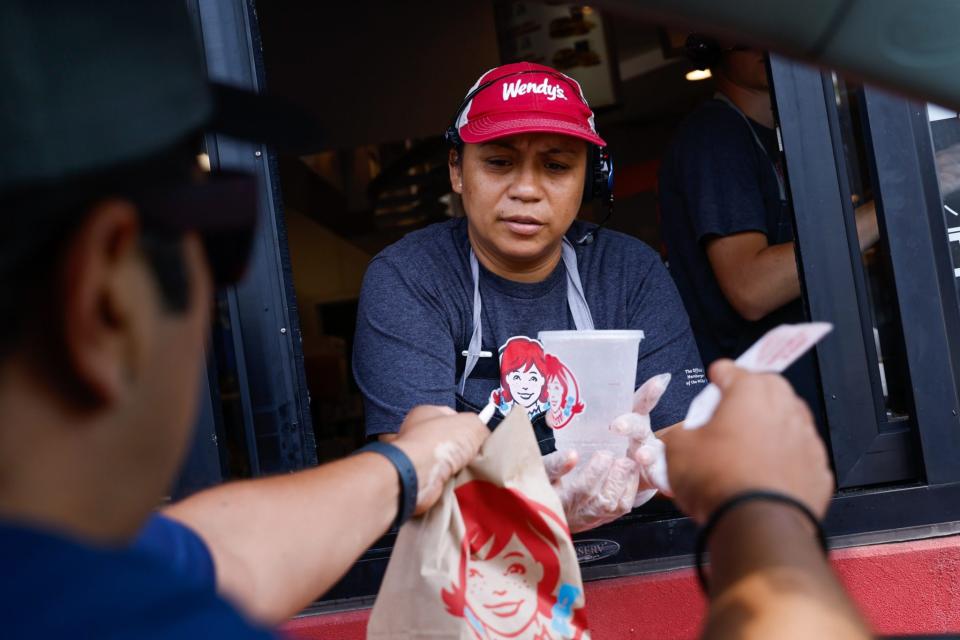The new quiet luxury is burgers and fries: Over 60% of Americans are buying less fast food because it’s just too expensive, survey finds

Move over, Hermès and Miu Miu—the newest luxury purse flying under the radar is a crinkled paper bag filled with burgers and greasy fries. The vast majority of Americans now find fast food way too expensive, dubbing it a “luxury,” a new report found.
Of 2,000 American adults, 78% considered fast food a luxury because of its price tag, loan marketplace LendingTree found in a survey released Monday, using data from QuestionPro commissioned by ValuePenguin. Half of respondents said their own stretched financial situation made fast food feel like a luxury, and more than six in 10 said they had cut down on fast food because of rising prices.
“Fast food often isn't this quick, cheap option anymore,” LendingTree chief credit analyst Matt Schulz told Fortune over email. “People are having sticker shock at the drive-thru, causing them to rethink how often they eat fast food.”
Respondents participated in the survey in early April—the same time California’s $20 minimum wage law for fast-food workers went into effect, causing chains like Chipotle to threaten 6%–7% increases in menu price. Even before the minimum wage law was enacted, consumers revolted against McDonald’s $18 Big Mac meal and blasted Wendy’s for its introduction of “dynamic pricing” in February, using AI to change menu item costs depending on the level of traffic during certain times of day. The burger chain backtracked the day after the announcement, saying it had no plans to raise prices, only provide discounts.
Indeed, pinched consumers are most concerned about surge pricing, with 72% of those surveyed saying they would dine during off-hours if it meant cheaper menu items. Over half of respondents said they now cook at home if they’re looking for a quick, cheap meal.
Stephen Zagor, food and restaurant consultant and adjunct assistant professor of business at the Columbia Business School, told Fortune that bad attitudes toward fast-food companies are an extension of the mentality so many have about the economy. As fast-food prices continue to rise even as inflation cools, consumer sentiment is dipping: In May, it reached its lowest point in six months.
“We're in this inflationary mental cycle as much as we are an inflationary reality cycle,” Zagor said.
‘They hear the customers’ pain’
But there’s good news on the horizon for customers feeling dejected by the state of fast-food prices, Zagor said. Burger chains are feeling pressure to make changes.
“They hear the customers’ pain, and they're trying to be responsive—as they well should be,” he said.
McDonald’s announced last week its plans to launch a $5 meal deal of a burger or chicken sandwich, fries, a four-piece nugget, and a drink. Wendy’s responded similarly, rolling out a $3 breakfast deal with breakfast potatoes and a choice of bacon or sausage, egg, and cheese English muffin.
The changes came after fast-food chains noticed sales dips driven by choosy customers.
“The consumer is certainly being very discriminating in how they spend their dollar,” McDonald’s CEO Chris Kempczinski said during a call with investors this month. “It may be more pronounced with lower-income consumers, but it’s important to recognize that all income cohorts are seeking value.”
While McDonald’s is only promising its $5 meal deal for a month—with franchisees asking the company to invest in the operation—additional promotions are likely to stick around, though likely in different forms, such as app-exclusive deals or cheap menu add-ons for digital orders, Zagor said.
Fast-food companies are under pressure to keep their customers happy, even if it is initially a bigger lift for investors and the bottom line, he argued. A “relationship-based” business, the restaurant industry still has to promise its diners a return on the dining experience, even if it’s just a quick drive-thru transaction. With over 70 million customers daily, chains like McDonald’s are a cornerstone of people’s lives, Zagor said, and they are under obligation to stay that way.
“The truth of the matter is, we love McDonald's. It's an American brand. It's who we are—good or bad, hate it or love it, think it's healthy or unhealthy. It's who we are.”
This story was originally featured on Fortune.com

 Yahoo Finance
Yahoo Finance 